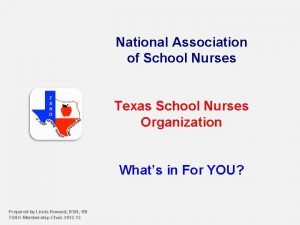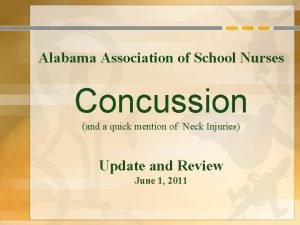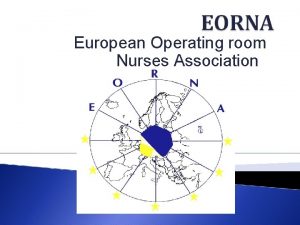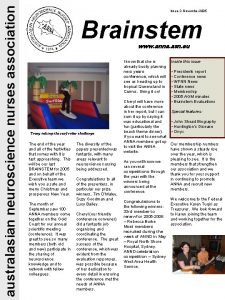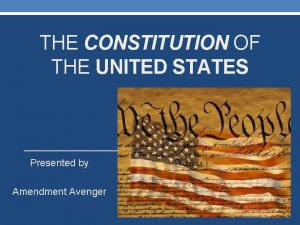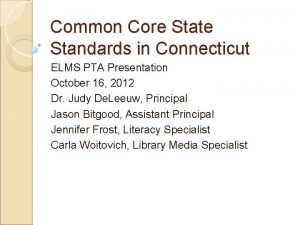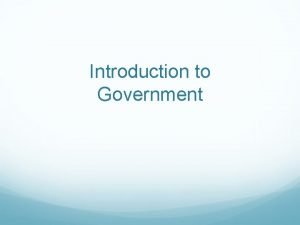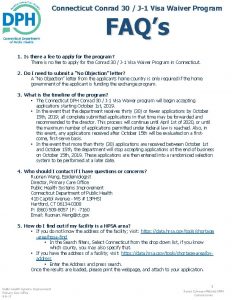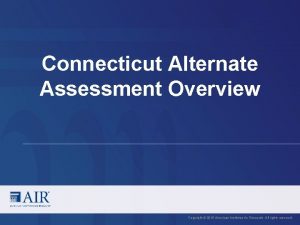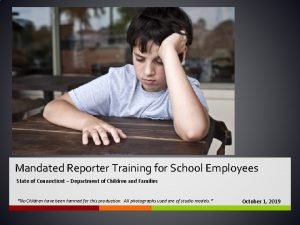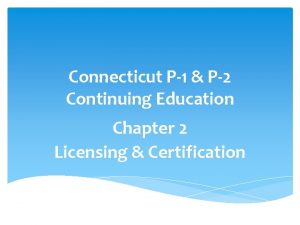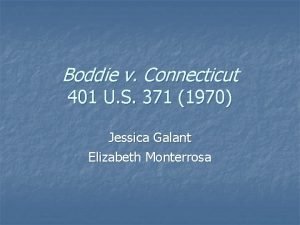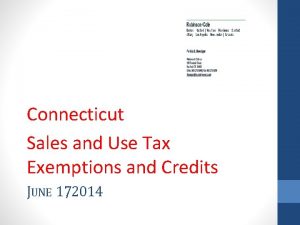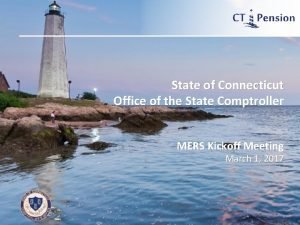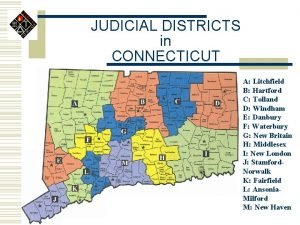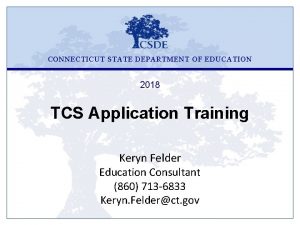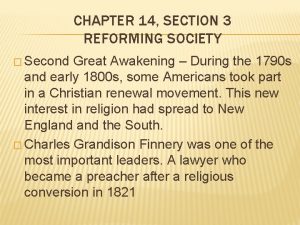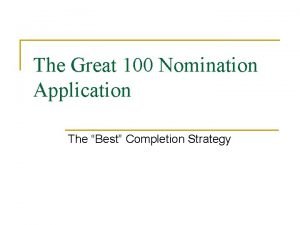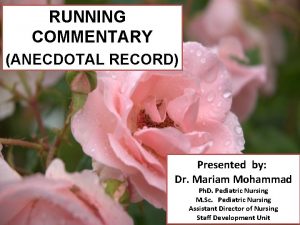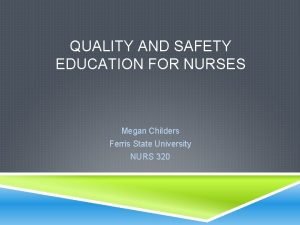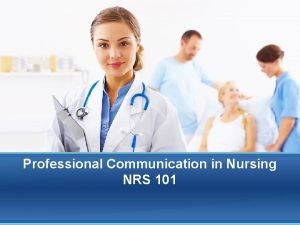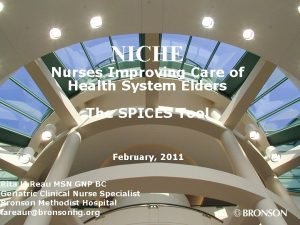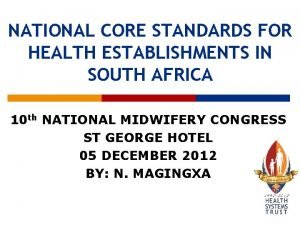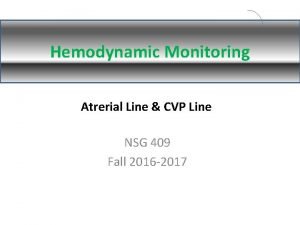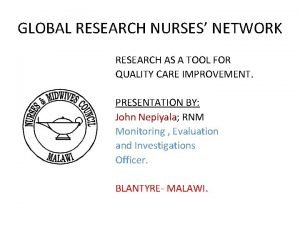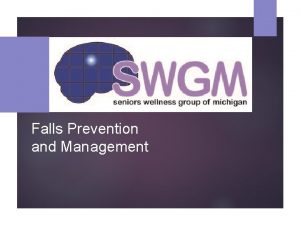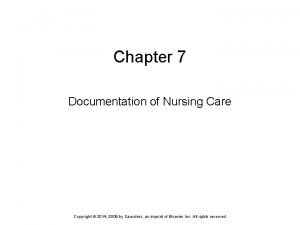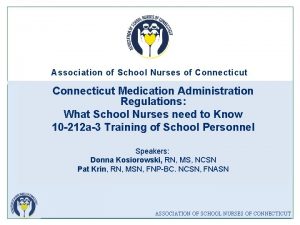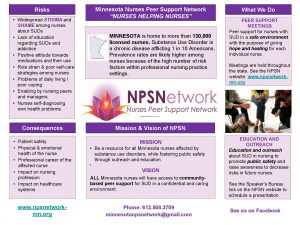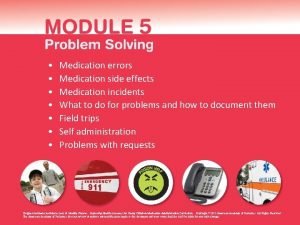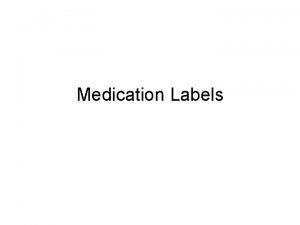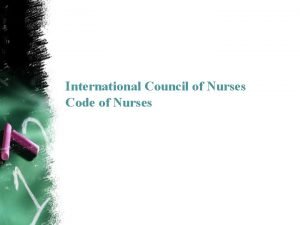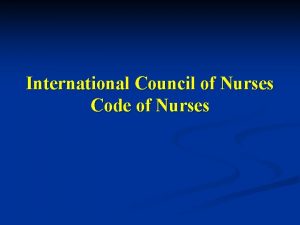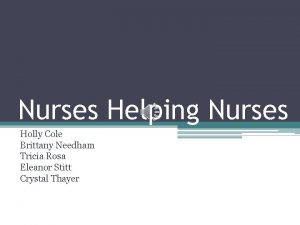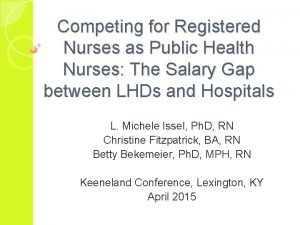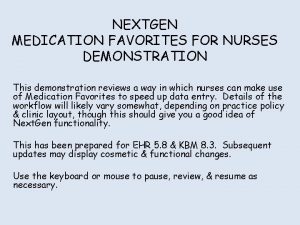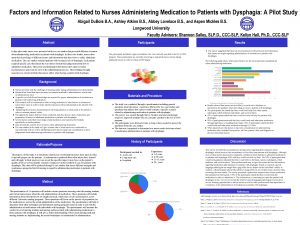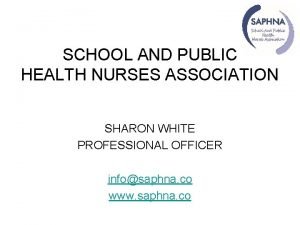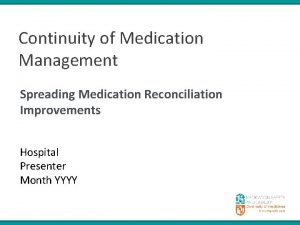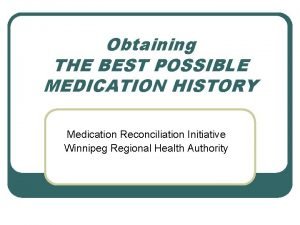ASSOCIATION OF SCHOOL NURSES OF CONNECTICUT Connecticut Medication

















































- Slides: 49

ASSOCIATION OF SCHOOL NURSES OF CONNECTICUT Connecticut Medication Administration Regulations: What School Nurses Need to Know

ASSOCIATION OF SCHOOL NURSES OF CONNECTICUT Connecticut Medication Administration Regulations: What School Nurses Need to Know Introduction

Introduction What is the difference between a law and a regulation? • Laws originate in the legislature. • Regulations originate in agencies and departments. • Laws define what to do • Regulations define how to do it. ASSOCIATION OF SCHOOL NURSES OF CONNECTICUT

Introduction How do we access information about Laws, Regs, etc. ? Laws can be accessed by googling the law number such as CGS 10 -212 a or going to https: //www. cga. ct. gov/ and searching for a word, phrase, Public Act #, Law #, Regulation # Chapter # etc. Why are there no regs for Diastat and Glucagon? Must have regs if law says regs will be written. Can’t claim ignorance of the law ASSOCIATION OF SCHOOL NURSES OF CONNECTICUT

Introduction Delegation: “ the transfer of responsibility of performing a nursing task to unlicensed assistive personnel while retaining the accountability of doing the task. “The need for delegation of nursing tasks in the school setting is greater today than ever before due to the following factors identified by NASN (Resha, 2010) Resha, C. , (May 31, 2010) "Delegation in the School Setting: Is it a Safe Practice? " OJIN: The Online Journal of Issues in Nursing Vol. 15, No. 2, Manuscript 5. ASSOCIATION OF SCHOOL NURSES OF CONNECTICUT

Introduction • Factors in Delegation • unfunded mandates, such as health screenings and immunization reporting, that pull the school nurse away from direct care; • shortage of qualified nursing staff in schools, i. e. , lack of nurses who meet the state requirement to work as a school nurse; • budgetary constraints that limit the schools’ ability to hire and retain qualified staff; • staffing patterns that assign one nurse to multiple school buildings thereby leaving buildings without nurses at various times; and ASSOCIATION OF SCHOOL NURSES OF CONNECTICUT

Introduction • Factors in Delegation • federal and state requirements, such as the Individuals with Disabilities Education Act (IDEA) of 1975, Section 504 of the Rehabilitation Act of 1973, and the Americans with Disabilities Act of 1990, requiring that school health services for complex student health needs, such as providing care to ventilatordependent children, be provided so that students can access their education” (Resha, 2010). Resha, C. , (May 31, 2010) "Delegation in the School Setting: Is it a Safe Practice? " OJIN: The Online Journal of Issues in Nursing Vol. 15, No. 2, Manuscript 5 ASSOCIATION OF SCHOOL NURSES OF CONNECTICUT

ASSOCIATION OF SCHOOL NURSES OF CONNECTICUT Connecticut Medication Administration Regulations: What School Nurses Need to Know 10 -212 a-1 Definitions

Section 10 -212 a-1. Definitions (3) Authorized Prescriber: • Physician- Doctor of Medicine (Ch. 370) or Osteopathy(Ch. 371) licensed in Connecticut or another state • Dentist- (Ch. 379)licensed in Connecticut or another state • Optometrist- (Ch. 380) licensed in Connecticut; within scope • Advanced Practice Registered Nurse- licensed in Connecticut (§ 20 -94 a CGS) • Physician Assistant- licensed to prescribe in Connecticut (§ 2012 d CGS) • Podiatrist – (Ch. 375) for interscholastic or intramural athletic events only ASSOCIATION OF SCHOOL NURSES OF CONNECTICUT

Section 10 -212 a-1. Definitions (4) “Before-and After-School Program” means • “Any child care program operated and administered by a local or regional board of education or municipality exempt from licensure by the Office of Early Childhood… • …Does not include public or private entities licensed by the Office of Early Childhood or board of education enhancement programs and extracurricular activities. ” ASSOCIATION OF SCHOOL NURSES OF CONNECTICUT

Section 10 -212 a-1. Definitions (16) “Extracurricular activities” means activities sponsored by local or regional boards of education that occur outside of the school day, are not part of the educational program, and do not meet the definition of before-and after-school programs and school readiness programs. ” Local policy may determine what qualifies as extracurricular. ASSOCIATION OF SCHOOL NURSES OF CONNECTICUT

Section 10 -212 a-1. Definitions (18) Intramural athletic events vs. (19) Interscholastic athletic events (18) “Intramural”- …means tryouts, competitions, practice, drills, and transportation to and from events that are within the bounds of a school district for the purpose of providing an opportunity for students to participate in physical activities and athletic contests that extend beyond the scope of the physical education program. ASSOCIATION OF SCHOOL NURSES OF CONNECTICUT

Section 10 -212 a-1. Definitions Intramural (18) vs. Interscholastic athletic (19)events (19) Interscholastic- means events between or among schools for the purpose of providing an opportunity for students to participate in competitive contests which are highly organized beyond the scope of intramural programs and includes tryouts, competition, practice, drills, and transportation to and from such events. (as an example, CIAC). ASSOCIATION OF SCHOOL NURSES OF CONNECTICUT

Section 10 -212 a-1. Definitions (20) “Investigational Drugs” means any medication with an approved investigational new drug (IND) application on file with the FDA which is being scientifically tested and clinically evaluated to determine its efficacy, safety, side effects, and which has not yet received FDA approval. ASSOCIATION OF SCHOOL NURSES OF CONNECTICUT

Section 10 -212 a-1. Definitions (38) “Research or study medications” means FDAapproved medications administered according to an approved study protocol. A copy of the study protocol shall be provided to the school nurse along with the name of the medication to be administered and the acceptable range of dose of such medication to be administered. ” ASSOCIATION OF SCHOOL NURSES OF CONNECTICUT

Section 10 -212 a-1. Definitions (24) “Medication Plan” means a documented plan established by the school nurse in conjunction with the parent and student regarding the administration of medication in school. Such a plan may be a stand alone plan, part of an IEP, an emergency care plan, or a medication administration form. ” ASSOCIATION OF SCHOOL NURSES OF CONNECTICUT

Section 10 -212 a-1. Definitions (25) “Medication Order” means the written direction by an authorized prescriber for the administration of medication to a student which shall include: • Name of student • Name and generic name of medication • Dosage of medication • Route of administration • Time of administration ASSOCIATION OF SCHOOL NURSES OF CONNECTICUT

Section 10 -212 a-1. Definitions (continued) (25) “Medication order” shall include (continued) • Frequency of administration • Indications for medication • Any potential side effects including overdose or missed dose • Start and termination dates not to exceed a 12 month period • Written signature of prescriber ASSOCIATION OF SCHOOL NURSES OF CONNECTICUT

Section 10 -212 a-1. Definitions Rights of Medication Administration • • • Right med Right amount/ dose Right person Right route Right time ASSOCIATION OF SCHOOL NURSES OF CONNECTICUT

Section 10 -212 a-1. Definitions § 212 a-3(36)“Qualified personnel” for schools • (a) Full time employee who meets the local or regional board of education requirements as a principal, teacher, OT, PT and has been trained in the administration of medication in accordance with § 10 -212 a-3 of these regulations. • (b) Coach or licensed athletic trainer who has been trained pursuant to § 10 -212(a)-8 of these regulations, or • (c) a paraprofessional who has been trained pursuant to § 10 -212(a)-9 of these regulations ASSOCIATION OF SCHOOL NURSES OF CONNECTICUT

Section 10 -212 a-1. Definitions § 212 a-3(37)“Qualified school employee” as defined in § 10 -212 a of the C. G. S. means a principal, teacher, licensed athletic trainer, licensed physical or occupational therapist employed by a school district, or coach. ASSOCIATION OF SCHOOL NURSES OF CONNECTICUT

Section 10 -212 a-1. Definitions (46) Teacher • … a person employed full time by a board of education who as met the minimum standards as established by that board of education for performance as a teacher and has been approved by the school medical advisor and school nurse to be designated to administer medications. • Does not necessarily mean “certified” (ex. Long term substitute or private school teacher). ASSOCIATION OF SCHOOL NURSES OF CONNECTICUT

A student with diabetes comes to your office with a complete and appropriate set of medication orders for insulin from the Joslin Center for Diabetes in Boston Mass. They are signed by the Nurse Practitioner at the clinic who manages the care of your student. Any thoughts or concerns? ? How would you handle this situation? ASSOCIATION OF SCHOOL NURSES OF CONNECTICUT

ASSOCIATION OF SCHOOL NURSES OF CONNECTICUT Connecticut Medication Administration Regulations: What School Nurses Need to Know 10 -212 a-2 Administration of Medications

Section 10 -212 a-2. Administration of medications (a) The board of education shall: (1) determine who shall administer medications in school – a licensed nurse or, in the absence of such licensed nurse, qualified personnel for schools; (2) Determine the circumstances under which self medication by students is permitted; ASSOCIATION OF SCHOOL NURSES OF CONNECTICUT

Section 10 -212 a-2. Administration of medications The board of education shall: (3) Develop with advice and approval of the SMA if any, or other qualified licensed physician, and the school nurse supervisor, specific written policies and procedures concerning the administration of medications to the students within the school system by a nurse or, in the absence of a nurse by qualified personnel for schools, for students who have a written order from a physician, dentist, optometrist, APRN, or physician assistant, and the written authorization of a parent or guardian. ASSOCIATION OF SCHOOL NURSES OF CONNECTICUT

Section 10 -212 a-2. Administration of medications The board of education shall: (4) Develop with the advice and approval of the SMA, if any, or other licensed physician, and the SN supervisor, specific written policies and procedures for the administration of epi as emergency first aid to students who experience allergic reaction and do not have a prior auth of a parent or prior written order of a qualified medical professional for the administration of epi, such policies and procedures to include provisions for: ASSOCIATION OF SCHOOL NURSES OF CONNECTICUT

Section 10 -212 a-2. Administration of medications Policies and procedures to include (cont): (A) the administration of epi as emergency first aid by the school nurse or, when the school nurse is absent or unavailable, by a qualified school employee who has completed the training required by CGS 10 -212 a; (B) the determination of the level of nursing services and number of qualified school employees needed to ensure that there is a SN or at least one such QSE who has completed the training on the grounds of each school in the district during regular school hours in the absence of a SN; ASSOCIATION OF SCHOOL NURSES OF CONNECTICUT

Section 10 -212 a-2. Administration of medications Policies and procedures to include (cont): (C) The determination of the supply of epi in cartridge injectors that shall be available in each school in the district; (D) The selection of qualified school employees by a school nurse or a school principal from employees who voluntarily agree to complete the training required by § 10 -212 a of the C. G. S. and to administer epi as emergency first aid; ASSOCIATION OF SCHOOL NURSES OF CONNECTICUT

Section 10 -212 a-2. Administration of medications Policies and procedures to include (cont. ): (E) A mechanism to ensure communication to one or more qualified school employees and other staff that the school nurse is absent or unavailable and that a qualified school employee shall be responsible for the emergency administration of epi; ASSOCIATION OF SCHOOL NURSES OF CONNECTICUT

Section 10 -212 a-2. Administration of medications Policies and procedures to include (cont): (F) A mechanism to ensure that persons who will administer epi as emergency first aid to students who experience allergic reactions but who do not have a prior written authorization of a parent or guardian or prior written authorization or a qualified medical professional for the administration of epi, are notified of the students whose parents have refused the emergency administration of epi; and (G) The determination of the regular school hours within its jurisdiction; and ASSOCIATION OF SCHOOL NURSES OF CONNECTICUT

Section 10 -212 a-2. Administration of medications (5) Review and revise, with the advice and approval of the school medical advisor, if any, or otherwise qualified licensed physician and the school nurse supervisor, the policies and procedures concerning the administration of medications as needed, but at least biennially. ASSOCIATION OF SCHOOL NURSES OF CONNECTICUT

Section 10 -212 a-2. Administration of medications (b) Except as provided in subsection (e) of this section no medication may be administered without: (1) The written order of an authorized prescriber; • Orders may be written by a physician, dentist, optometrist, APRN, PA (2) the written authorization of the parent/guardian (or eligible student) (3) the written permission of the parent for the exchange of information between the prescriber and the school nurse necessary to ensure the safe administration of such medication. ASSOCIATION OF SCHOOL NURSES OF CONNECTICUT

Section 10 -212 a-2. Administration of medications (c) Prescribed medication shall be administered to and taken by only the person for whom the prescription has been written. (d) Except as provided in subsection (e) of this section, in the absence of a licensed nurse, only qualified personnel for schools who have been properly trained may administer medications to students as delegated by the school nurse, specifically: (1) Qualified personnel for schools may administer oral, topical, intranasal, or inhalant medications. ASSOCIATION OF SCHOOL NURSES OF CONNECTICUT

Section 10 -212 a-2. Administration of medications (2) Except as provided in subsection (e) of this section, medications with a cartridge injection may be administered by qualified personnel for schools only to a student with a medically diagnosed allergic condition which may require prompt treatment to protect the student against serious harm or death. (3) Investigational drugs or research or study medications may not be administered by qualified personnel for schools. ASSOCIATION OF SCHOOL NURSES OF CONNECTICUT

Section 10 -212 a-2. Administration of medications (4) Coaches and licensed athletic trainers who have been trained in the administration of medication pursuant to § 10 -212 a-8 of the Regulations of CT State Agencies may, during intramural or interscholastic events, administer medications pursuant to § 10 -212 a-8 of the Regulations of CT State Agencies. ASSOCIATION OF SCHOOL NURSES OF CONNECTICUT

Section 10 -212 a-2. Administration of medications (5) Paraprofessionals who have been trained in the administration of medication pursuant to § 10212 a-9 of the Regulations of CT State Agencies, by the local or regional board of education , may administer medications, including meds administered with a cartridge injector to a specific student with a medically diagnosed allergic condition that may require prompt treatment in order to protect the student against serious harm or death medications pursuant to § 10 -212 a-9 of the Regulations of CT State Agencies. ASSOCIATION OF SCHOOL NURSES OF CONNECTICUT

Section 10 -212 a-2. Administration of medications (e) (1) Qualified school employees who have completed the training required by § 10 -212 a of the Connecticut General Statutes may administer epinephrine to students who experience allergic reactions but do not have a prior written authorization of a parent or guardian or the written order of a qualified medical professional for the purpose of emergency first aid as set forth in § 10 -212 a of the Connecticut General Statutes and § 10 -212 a-1 through 10 -212 a-10, inclusive, of the Regulations of Connecticut State Agencies. (2) The parent or guardian of a student may submit, in writing, to the school nurse or school medical advisor, if any, a notice that epinephrine shall not be administered to such student. The school district shall annually notify parents/guardians of the need to provide such written notice. ASSOCIATION OF SCHOOL NURSES OF CONNECTICUT

Section 10 -212 a-2. Administration of medications • Special Considerations – Glucagon; – Epinephrine; and – Diastat ASSOCIATION OF SCHOOL NURSES OF CONNECTICUT

• Qualified School Employees for Glucagon, Diastat, and Epinephrine – Principal – Teacher – Licensed Athletic trainer – Licensed PT or OT employed by the school board – Coach – Paraprofessional ASSOCIATION OF SCHOOL NURSES OF CONNECTICUT

Section 10 -212 a-2. Administration of medications Epinephrine for undiagnosed students § 10 -212 a(d)(2) – School nurse or principal will select a qualified school employee to administer medication in a cartridge injector to a student who experiences a life threatening allergic reaction but does not have prior written authorization from a parent or prior written order of a qualified medical professional if the school nurse is absent unavailable. ASSOCIATION OF SCHOOL NURSES OF CONNECTICUT

Section 10 -212 a-2. Administration of medications • Epinephrine-Other Requirements – Employee must volunteer – Has completed annual training including CPR and First Aid – Parents have ability to opt out (notified yearly) – On school grounds – During school hours – Stock epinephrine available – Policy component ASSOCIATION OF SCHOOL NURSES OF CONNECTICUT

Section 10 -212 a-2. Administration of medications Glucagon CGS Sec. 10 -212 a(e)(1) – School nurse or principal will select a qualified school employee to give a glucagon injection, if the school nurse is absent or unavailable, to a student with diabetes who requires prompt treatment. • Written authority from the parent or guardian • Written order from a CT licensed physician under Chapter 370 ASSOCIATION OF SCHOOL NURSES OF CONNECTICUT

Section 10 -212 a-2. Administration of medications • Other Requirements for Glucagon – Employee must volunteer; – Has completed annual training; – School nurse and school medical advisor attest in writing that training has occurred. ASSOCIATION OF SCHOOL NURSES OF CONNECTICUT

Section 10 -212 a-2. Administration of medications • Diastat PA 15 -215 – School nurse or principal will select a qualified school employee to give antiepileptic medication including by rectal syringe if the school nurse is absent or unavailable to a specific student with a medically diagnosed epileptic condition who requires prompt treatment and is in accordance with a seizure action plan. • Written authority from the parent or guardian • Written order from a licensed CT physician ASSOCIATION OF SCHOOL NURSES OF CONNECTICUT

Section 10 -212 a-2. Administration of medications • Other Requirements for Diastat – SDE must develop med admin training program – Employee must volunteer – Has completed annual training and monthly review – School nurse and school medical advisor attest in writing that training has occurred ASSOCIATION OF SCHOOL NURSES OF CONNECTICUT

Section 10 -212 a-2. Administration of medications Case Study You are working in a high school and have a SBHC in your building. You are planning for selecting the Qualified School personnel who shall be trained in the event that a student with an unknown allergy experiences the symptoms of anaphylaxis. Which of the following would be appropriate person for this task? Why or why not? A, The nurse practitioner in the SBHC B. The office secretary C. The football coach in the event it happens after school during practice D. A paraprofessional who is also an EMT E. A health assistant in your office F. The school principal who hates “blood” and never visits your office G. A teacher who has volunteered ASSOCIATION OF SCHOOL NURSES OF CONNECTICUT C

Section 10 -212 a-2. Administration of medications You have a new medication order for a newly diagnosed student with cancer. The medication is part of an investigational study. You have questions regarding the appropriate dose prescribed by the MD but do not have permission to speak to him. How can this be handled? Is there any other documentation needed to administer this medication? You are only in this school 3 days per week but the medication is ordered daily. Who would be the appropriate person to delegate this to? ASSOCIATION OF SCHOOL NURSES OF CONNECTICUT

Resources • Clinical Procedure Guidelines for Connecticut School Nurses http: //www. sde. ct. gov/sde/cwp/view. asp? a=2663&q=334198#de legation • CT General Assembly Website https: //www. cga. ct. gov/, • CT Education Laws as of January 1, 2015 http: //www. sde. ct. gov/sde/lib/sde/pdf/publications/ed_laws_20 15. pdf • Bobo, N. (2014). Principles for Practice Nursing Delegation to Unlicensed Assistive Personnel in the School Setting, NASN. • Resha, C. , (May 31, 2010) "Delegation in the School Setting: Is it a Safe Practice? " OJIN: The Online Journal of Issues in Nursing Vol. 15, No. 2, Manuscript 5 ASSOCIATION OF SCHOOL NURSES OF CONNECTICUT
 Texas association of school nurses
Texas association of school nurses Alabama association of school nurses
Alabama association of school nurses Connecticut surplus lines tax
Connecticut surplus lines tax Kiana cooper
Kiana cooper Catholic nurses association
Catholic nurses association Operating room nurses association
Operating room nurses association Catholic nurses association
Catholic nurses association American nurses association illinois
American nurses association illinois Australasian neuroscience nurses association
Australasian neuroscience nurses association Ex post facto law
Ex post facto law State of connecticut division of criminal justice
State of connecticut division of criminal justice Decd
Decd Connecticut college transfer
Connecticut college transfer Connecticut common core state standards
Connecticut common core state standards Sex offender registration in connecticut
Sex offender registration in connecticut Vanderman manufacturing company
Vanderman manufacturing company Vinelink connecticut
Vinelink connecticut Principle of separation of powers
Principle of separation of powers Connecticut conrad 30
Connecticut conrad 30 Ctsecurebrowser
Ctsecurebrowser Mandated reporter training ct
Mandated reporter training ct Connecticut plumbing license
Connecticut plumbing license Boddie v. connecticut
Boddie v. connecticut Connecticut early childhood education cabinet
Connecticut early childhood education cabinet Maine coastline length
Maine coastline length Connecticut manufacturing sales tax exemption
Connecticut manufacturing sales tax exemption Case management information system
Case management information system Ct sde certification
Ct sde certification Connecticut comptroller
Connecticut comptroller Wic approved cereal
Wic approved cereal Southern connecticut state university public health
Southern connecticut state university public health Connecticut judicial districts
Connecticut judicial districts Tcs connecticut
Tcs connecticut John haynes connecticut
John haynes connecticut Started an all-female academy in hartford, connecticut.
Started an all-female academy in hartford, connecticut. Great 100 nurses nomination examples
Great 100 nurses nomination examples Anecdotal record in nursing
Anecdotal record in nursing Megan childers
Megan childers Nurses note example
Nurses note example Nurses improving care for healthsystem elders
Nurses improving care for healthsystem elders 6 key priorities
6 key priorities Metric to household conversion
Metric to household conversion Phlebostatic axis
Phlebostatic axis Cvp values
Cvp values Global research nurses
Global research nurses Fall prevention quiz
Fall prevention quiz Pie nursing documentation example
Pie nursing documentation example Indications for blood transfusion in anemia
Indications for blood transfusion in anemia Admission procedure in hospital
Admission procedure in hospital What is revalidation
What is revalidation
